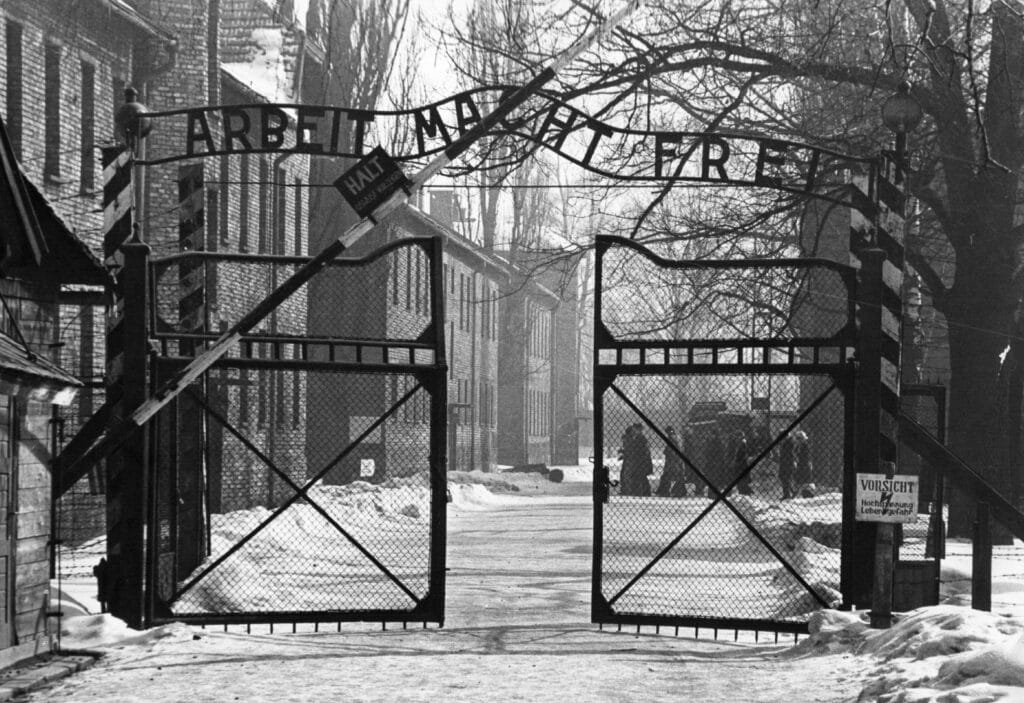Can the Sacrament of Reconciliation even extend to Rudolf Hoess, commandant of Auschwitz?
The key theme this Ash Wednesday is that ashes symbolise death and penitence. Recent events in Israel have reminded us of the continual plight of the Jewish people. The ashes of the Holocaust emphasise wrongful death on a scale that is all but unimaginable and incomprehensible. Just as incomprehensible is whether within those terrible ashes The post Can the Sacrament of Reconciliation even extend to Rudolf Hoess, commandant of Auschwitz? appeared first on Catholic Herald.

The key theme this Ash Wednesday is that ashes symbolise death and penitence. Recent events in Israel have reminded us of the continual plight of the Jewish people. The ashes of the Holocaust emphasise wrongful death on a scale that is all but unimaginable and incomprehensible.
Just as incomprehensible is whether within those terrible ashes that the Nazis left behind there could be any chance of redemption for the perpetrators of one of the greatest crimes ever against humanity.
This quandary is brought to mind by Jonathan Glazer’s film The Zone of Interest, which follows Rudolf Hoess – commandant of Auschwitz – and his family as they go about their day-to-day business while living next door to the infamous Nazi death camp.
The film is a harrowing though absorbing study in evil, but it is incomplete in a crucial way. It leaves out how Hoess returned to his Catholic faith and sought absolution for his appalling sins and key role in that crime against humanity.
The reversion of Hoess invites a theological examination of his life which is absent from the film, but crucial to trying to understand his actions and the events of the 20th Century.
The non-descript title – taken from the term Nazis used to refer to the area around Auschwitz – reflects the central theme of the film: evil is banal and indifferent. There is nothing overtly unpleasant about the Hoess family. They close their minds to the human suffering they are complicit in and build their ideal life.
Commentators have drawn on Hannah Arendt’s famous phrase “the banality of evil”, which she used to describe Adolf Eichmann during his trial in Israel for organising the deportation of Jews during the Final Solution. Her conclusion was that grave evil is committed not by monsters but by ordinary people.
The film likewise emphasises the dispassionate, unremarkable nature of Hoess. He is presented as a calm, well-put-together, decent father. He never loses his temper at the incessant crying of the baby – the only family member, other than the visiting grandmother, who senses something is deeply wrong – he takes his children on boating trips, reads them stories before bed and dotes on his wife.
We don’t see him shout at or abuse prisoners, in contrast to Amon Goeth – commandmant of Kraków-Płaszów concentration camp and portrayed by Ralph Fiennes in Schindler’s List – who would shoot at prisoners for sport and set his dogs on them. For Hoess, genocide was not something to be enjoyed, but a logistical problem to be tackled in a disciplined and orderly manner.
The Zone of Interest invites the viewer to identify with the Hoesses, to imagine that we too might have joined the ranks of ordinary men and women who dissociated themselves from the evil they participated in. The film ends with Hoess unrepentant and the war’s finale still to come.
Viewers may be surprised to learn that in the aftermath of Hoess’ eventual capture 10 months after the war’s end, Hoess returned to the Catholic Church, which he had turned his back on during his youth, received the Sacrament of Reconciliation and took communion before being hanged at Auschwitz.
I teach Religious Education at a Catholic school and my students are mesmerised by the Sacrament of Reconciliation. Understandably so. It is a profound and life-altering sacrament; as can be attested to by any who have stepped into the confessional, believing truly that they deserved to be blown away like a piece of dust, and instead encountered the forgiving love of Christ.
The confessional embraces the sinner with the truth at the heart of our faith: the price has already been paid – Christ went to the cross for me.
After the initial reassurance that the priest can tell no-one what they have confessed to him, students often ask: can any sin be forgiven? If so, could Hitler have turned to Christ and now be in heaven?
The answer is, of course, yes, but I admit we typically reassure ourselves Hitler probably never repented.
Rudolf Hoess offers no reassurance for hopes of cosmic vengeance, though. If his Confession was sincere, his soul has been saved.
Should we, then, pray for Rudolf Hoess? Such a prayer feels uncomfortable; an insult to those he turned into ashes. But at the same time, to reject the possibility of his salvation is not to question the enormity of his crimes, but to doubt the power of Christ’s redeeming love.
Hoess was raised in a Catholic family, one which seemed big on rules and obedience but devoid of love. Though a zealous altar boy and nudged towards the priesthood, Hoess’ faith was shaken after a priest broke the seal of the confessional and told Hoess’ father of a schoolboy misdemeanour that Hoess had confessed. Aged 22, Hoess apostatised.
The Church teaches that we are created for worship. In the absence of God, we will worship something else. Hoess found his idol in Adolf Hitler and the doctrine of National Socialism. For Hoess the new dogma became the guiding maxim of thought and action; it took priority over ordinary morality and human sensitivity. What served the dogma was to be done; what detracted from it was to be avoided.
The ideological exercise in creating a new reality took concrete form in the Hoess’ constructing of their “ideal life” at their villa in Auschwitz. His wife cultivated a vegetable garden and the family delighted in their various excursions around the nearby countryside. They tuned out the noise of the neighbouring camp and imagined they had built their own paradise.
The mirage crumbled when the war ended. Hitler’s suicide and Himmler’s encouragement for other leaders to go into hiding had the effect of betraying Hoess’ belief in his superiors’ divine-like wisdom. In prison, Hoess encountered love and developed contrition for his sins. He wrote to the state prosecutor:
“My conscience compels me to make the following declaration. In the solitude of my prison cell I have come to the bitter recognition that I have sinned gravely against humanity. As Commandant of Auschwitz I was responsible for carrying out part of the cruel plans of the ‘Third Reich’ for human destruction. In so doing I have inflicted terrible wounds on humanity.
“I caused unspeakable suffering for the Polish people in particular. I am to pay for this with my life. May the Lord God forgive one day what I have done. I ask the Polish people for forgiveness. In Polish prisons I experienced for the first time what human kindness is.
“Despite all that has happened I have experienced humane treatment which I could never have expected, and which has deeply shamed me. May the facts which are now coming out about the horrible crimes against humanity make the repetition of such cruel acts impossible for all time.”*
Hoess asked for a priest – naming a priest who had snuck into the camp to see and minister to his brethren before they were killed (Hoess had been impressed by the priest’s bravery and ordered that he be released unharmed.) After Confession, Hoess made a declaration of Faith, received viaticum and shortly thereafter was hanged in the same camp of death and despair he had presided over.

In a final twist, one of the last things that Hoess probably saw was the sign that adorns the entrance to Auschwitz: Arbeit macht frei (“Work makes you free”). It was a taunting lie to the prisoners, none of whom earnt their freedom by working. It was also an anti-slogan of Christ’s words that the Truth will set you free.
Works alone cannot save you, but nor can works alone condemn you. That is the truth absent from The Zone of Interest and from our culture more generally. It is accepted that an ordinary man can become evil, but not that a wicked man can be saved.
On Ash Wednesday, Catholics receive ashes, marked in the sign of the cross. By the price of the cross, Christ has claimed the penitent – and all their sins – as his own.
So as we look upon the evil we and others commit, we gaze upon the cross and pray: “Oh my Jesus, forgive us our sins. Save us from the fires of hell. Lead all souls to heaven especially those in most need of those mercy.”
Angus Milne teaches Religious Studies at a Catholic School in the South East of England.
*Manfred Deselaers, “Und Sie hatten nie Gewissensbisse?” Die Biographie von Rudolf Höß, Kommandant von Auschwitz, und die Frage nach seiner Verantwortung vor Gott und den Menschen (Leipzig: Benno-Verlag, 1997)
(Photo credit: iweta0077; iStock by Getty Images.)
![]()
The post Can the Sacrament of Reconciliation even extend to Rudolf Hoess, commandant of Auschwitz? appeared first on Catholic Herald.














